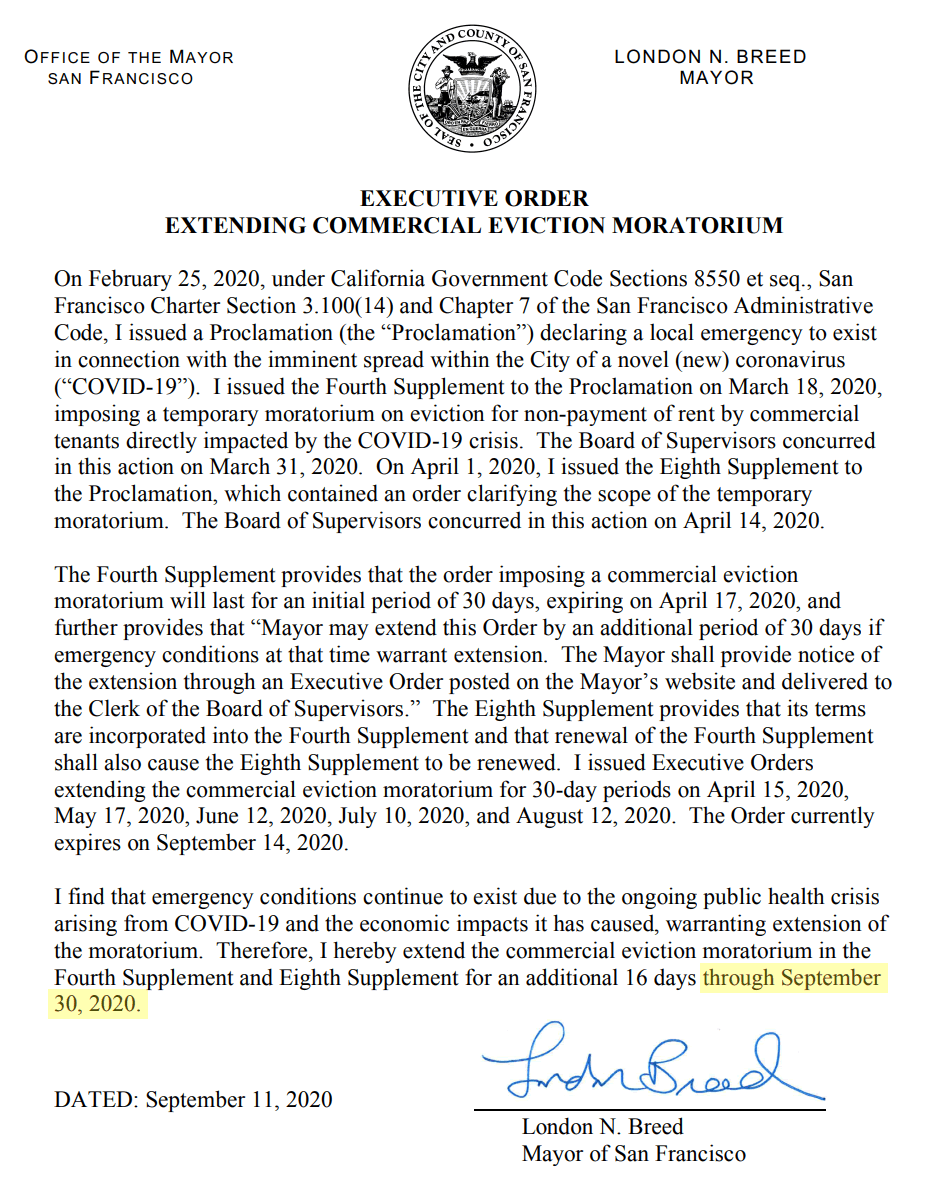Governed by state law, local governments normally can’t exert control over commercial leases. But having been enabled by an Executive Order issued by Governor Newsom back in March (N-28-20), and then extended in June, San Francisco was able to enact an eviction moratorium for small and medium-sized businesses (defined as businesses with up to $25 million in pro-rated gross receipts last year) which have been directly impacted by the pandemic.
San Francisco’s initial 30-day order has since been extended six times. And since March 17 of this year, landlords have been unable to recover possession of commercial spaces occupied by businesses that have continued to qualify under the order due to any missed or delayed rent payments.
But unless Governor Newsom extends the State’s Executive Order, which is set to expire at the end of this month, San Francisco’s commercial eviction moratorium will expire on September 30. And unlike San Francisco’s moratorium on residential evictions, landlords will not be restricted from evicting businesses for past due rents, with a one-month grace period to cure, once the commercial moratorium expires.
UPDATE (9/30): Small Business Eviction Can Kicked Down the Road

insane
This will free up thousand of storefronts …for all those businesses that have been waiting for years to open, but never have (despite hundreds – thousands? – already being empty).
….because the rent is way too high.
That’s likely part of it; but also restrictions that require retail tenants, or that required the space be built (as a storefront) in the first place.
Any commercial landlord that is in the business more than a day or two knows it is better to have a partial paying tenant than to keep the place vacant for the next 3 years. So, don’t be in such a hurry to shed your tears.
At the end of the day, it is the market/economic condition that drives rent – both residential and commercial. Executive order is for show.
Welcome to capitalism….
Thousands of empty commercial properties across the city with no or only marginal price drop (or, in some cases, even prices increase) (and many places simply left empty and unavailable) in the face of the greatest supply onslaught in city history say you and your simplistic Econ 1 truisms are wrong.
and some will continue to occupy and not pay rent, as it’s in the developer’s best interest to have an active occupancy and no rent than an empty boarded up storefront and no rent.
Proposition 15 may have an impact on commercial rents. It will be interesting to see what happens.
This. If the split roll passes, it will have a big impact on commercial properties affected.
No different than if Prop. 13 gets repealed for residential homes and property taxes are reassessed based on current market values. You would see an entire segment who no longer could afford to live in their homes.
Imagine the above combined with no rent or lopsided rent and eviction controls. If you thought the wildfires were bad, wait until the city proper burns…metaphorically and literally.
It appears to not be doing well: that is, tho currently ahead in the polling it isn’t ahead ENOUGH, apparently, to offset a pre-election surge of opposition.
Got to learn to survive whatever California politicians throw at you. When you’re running a business here, you’ve got to embrace your inner cockroach, make yourself very hard to exterminate.
What impact has COVID had on London Breed’s income? Zero, of course. Safety trade-offs are the best when other people absorb the downsides for you. Taxes still accrue.
Oh boy now the BOS can institute their new $250 dollar per frontage foot vacancy tax on landlords with empty retail space. The wisdom of it all is mind boggling.
“There are some ideas so absurd that only an intellectual could believe them.” ― George Orwell
Yes, because we must avoid price discovery no matter what. The horror, the horror…
Price discovery? If by “price discovery” you mean the fair market value of a commercial space for lease, it is what renters are willing to pay for the particular space.
UPDATE: On a related note, San Francisco will allow restaurants to resume indoor dining at 25% capacity, with up to 100 people, once the city is classified as “orange” (“Moderate” risk) on the State’s tiered “Blueprint for a Safer Economy” system, a move which could occur, at the soonest, at the end of the month with the city currently ranked in the “red” (“Substantial” risk).
UPDATE: Small Business Eviction Can Kicked Down the Road